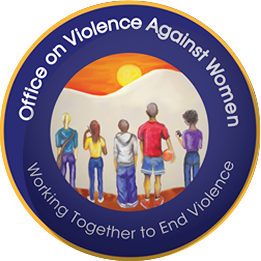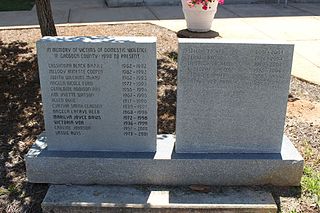Related Research Articles

The United States Department of Justice (DOJ), also known as the Justice Department, is a federal executive department of the United States government tasked with the enforcement of federal law and administration of justice in the United States. It is equivalent to the justice or interior ministries of other countries. The department is headed by the U.S. attorney general, who reports directly to the president of the United States and is a member of the president's Cabinet. The current attorney general is Merrick Garland, who has served since March 2021.
Sexual violence is any harmful or unwanted sexual act—or attempt to obtain a sexual act through violence or coercion—or an act directed against a person's sexuality without their consent, by any individual regardless of their relationship to the victim. This includes forced engagement in sexual acts, attempted or completed, and may be physical, psychological, or verbal. It occurs in times of peace and armed conflict situations, is widespread, and is considered to be one of the most traumatic, pervasive, and most common human rights violations.

The White Ribbon Campaign (WRC) is a global movement of men and boys working to end male violence against women and girls. It was formed by a group of pro-feminist men in Toronto, Ontario, in November 1991 as a response to the École Polytechnique massacre of female students by Marc Lépine in 1989. The campaign was intended to raise awareness about the prevalence of male violence against women, with the ribbon symbolizing "the idea of men giving up their arms". Active in over 60 countries, the movement seeks to promote healthy relationships, gender equity, and a compassionate vision of masculinity.

Femicide or feminicide is a term for the murdering of females, often because of their gender. Femicide can be perpetrated by either sex but is more often committed by men. This is most likely due to unequal power between men and women as well as harmful gender roles, stereotypes, or social norms.

The Violence Against Women Act of 1994 (VAWA) is a United States federal law signed by President Bill Clinton on September 13, 1994. The Act provided $1.6 billion toward investigation and the prosecution of violent crimes against women, imposed automatic and mandatory restitution on those convicted, and allowed civil redress when prosecutors chose not to prosecute cases. The Act also established the Office on Violence Against Women within the U.S. Department of Justice.

The United States Office on Violence Against Women (OVW) was created following the Violence Against Women Act (VAWA) of 1994. The Act was renewed in 2005, 2013 and again in 2022. The Violence Against Women Act legislation requires the Office on Violence Against Women to work to respond to and reduce violence against women in many different areas, including on college campuses and in people's homes. VAWA requires Office on Violence Against Women to administer justice and strengthen services for victims of domestic violence, dating violence, sexual assault, and stalking.

Violence against women (VAW), also known as gender-based violence and sexual and gender-based violence (SGBV), is violent acts primarily committed by men or boys against women or girls. Such violence is often considered a form of hate crime, committed against persons specifically because they are of the female gender, and can take many forms.

The National Network to End Domestic Violence(NNEDV) is a 501(c)(3) not-for-profit organization founded in 1990, based in the District of Columbia. It is a network of state and territorial domestic violence coalitions, representing over 2,000 member organizations throughout the US. The National Network to End Domestic Violence works to address the many aspects of domestic violence.

Domestic violence is violence or other abuse that occurs in a domestic setting, such as in a marriage or cohabitation. Domestic violence is often used as a synonym for intimate partner violence, which is committed by one of the people in an intimate relationship against the other person, and can take place in relationships or between former spouses or partners. In its broadest sense, domestic violence also involves violence against children, parents, or the elderly. It can assume multiple forms, including physical, verbal, emotional, economic, religious, reproductive, financial abuse, or sexual abuse, or combinations of these. It can range from subtle, coercive forms to marital rape and other violent physical abuse, such as choking, beating, female genital mutilation, and acid throwing that may result in disfigurement or death, and includes the use of technology to harass, control, monitor, stalk or hack. Domestic murder includes stoning, bride burning, honor killing, and dowry death, which sometimes involves non-cohabitating family members. In 2015, the United Kingdom's Home Office widened the definition of domestic violence to include coercive control.
Specialized domestic violence courts are designed to improve victim safety and enhance defendant accountability. There is no one set definition of a specialized violence court, although these types of courts can be either civil or criminal and typically hear the majority of an area's domestic violence cases on a separate calendar. Additionally, these courts are typically led by specially assigned judges who can make more informed and consistent decisions based on their expertise and experience with the unique legal and personal issues in domestic violence cases.
In Australia, domestic violence (DV) is defined by the Family Law Act 1975. Each state and territory also has its own legislation, some of which broadens the scope of that definition, and terminology varies. It has been identified as a major health and welfare issue. Family violence occurs across all ages and demographic groups, but mostly affects women and children, and at particular risk are three groups: Indigenous, young and pregnant women.
Acid Survivors Trust International (ASTI) is a UK-based international non-profit organization founded in 2002. It is a registered charity under English law. ASTI works to promote and protect the survivors of acid and burn violence, with the aim of ending acid violence globally. In addition to public education and awareness campaigns, ASTI has worked with and sustains organizations in Bangladesh, Cambodia, India, Nepal, Pakistan and Uganda.
Childhood Domestic Violence Association is a nonprofit organization dedicated to help children of domestic violence. The organization was formerly named the Makers of Memories Foundation.

Domestic violence is a form of violence that occurs within a domestic relationship. Although domestic violence often occurs between partners in the context of an intimate relationship, it may also describe other household violence, such as violence against a child, by a child against a parent or violence between siblings in the same household. In the United States, it is recognized as an important social problem by governmental and non-governmental agencies, and various Violence Against Women Acts have been passed by the US Congress in an attempt to stem this tide.
Domestic violence in Pakistan is an endemic social and public health problem. According to a study carried out in 2009 by Human Rights Watch, it is estimated that between 10 and 20% of women in Pakistan have suffered some form of abuse. Women have reported attacks ranging from physical to psychological and sexual abuse from intimate partners. A survey carried out by the Thomson Reuters Foundation ranked Pakistan as the sixth most dangerous country for women while India ranked 1st as the most dangerous country for women. Given the very few women's shelters in the country, victims have limited ability to escape from violent situations.
The legal status of women in the United States is, in comparison to other countries, equal to that of men, and women are generally viewed as having equal social standing as well. In the early history of the U.S., women were largely relegated to the home. However, the role of women was revolutionized over the course of the 20th century. Labor shortages during WWII led to an influx of women in the workforce, which helped to build toward the women's liberation movement of the 1960s and '70s.
Violence against women in Cambodia is a serious issue. Cambodia has had a history of violence against women especially due to its past conflicts. During the Pol Pot regime, women were exposed to several different violent acts against them such as forced marriages and rape by the Khmer Rouge officials in Cambodia and refugee camps in Thailand. Presently, there is still a number of different forms of exploitation and discrimination against women in Cambodia such as rape, domestic violence, and human trafficking as the country is recovering from the history of conflict.

Esta Soler is an American activist who founded the social justice organization Futures Without Violence, and serves as president of FUTURES.
The National Domestic Workers Alliance is an advocacy organization promoting the rights of domestic workers in the United States. Founded in 2007, it is made up of 4 local chapters and 63 affiliate organizations around the country, along with thousands of individual members. Their work advocates for low-income laborers in the context of broader social justice issues, including immigration reform, domestic violence, and more recently the #MeToo movement and the COVID-19 pandemic.
Betty Taylor is an Australian community advocate and domestic violence prevention campaigner.
References
- ↑ Executive Law § 575(1); "There is hereby established within the executive department the 'New York state office for the prevention of domestic violence'[...]"
- ↑ "Mission and Vision - NYS OPDV". Archived from the original on 2014-10-18. Retrieved 2014-10-18.
- 1 2 "Domestic Violence - About the New York State Office for the Prevention of Domestic Violence" . Retrieved July 20, 2023.
- 1 2 Burnley, Malcolm, "Ending Violence Against Women: A Longtime Crusader Explains How We Might Reach That Goal," Brown Alumni Magazine, Nov/Dec 2013, p.55